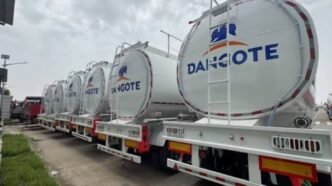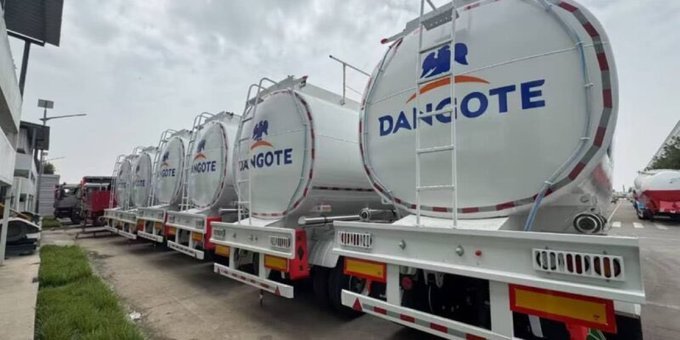The Nigerian petroleum distribution landscape is undergoing a major transformation as bulk fuel buyers across the country increasingly bypass middlemen and turn directly to the Dangote Petroleum Refinery for supplies. This emerging trend, which has gained momentum in recent months, is reshaping market dynamics, altering profit margins, and sparking debates about the future of fuel distribution in Africa’s largest economy.
The Dangote Refinery, Africa’s largest integrated petrochemical facility, has quickly become a game-changer since it commenced operations. Located in the Lekki Free Trade Zone, Lagos, the $20 billion facility has the capacity to refine 650,000 barrels of crude oil per day. Its production of gasoline, diesel, aviation fuel, and other petroleum products has not only reduced Nigeria’s dependence on imports but has also created new distribution opportunities within the downstream sector.
With middlemen traditionally playing a dominant role in fuel distribution, the direct sourcing approach being adopted by bulk buyers represents a significant departure from decades of practice. For years, oil marketers, distributors, and retailers relied heavily on intermediaries who served as links between refineries, depots, and end-users. However, as more businesses and organizations seek to cut costs, improve efficiency, and ensure product authenticity, bypassing these intermediaries has become the preferred option.
Why Bulk Buyers Are Cutting Out Middlemen
Several factors are driving this shift in procurement strategy.
1. Cost Savings
One of the most compelling reasons bulk buyers are dumping middlemen is cost reduction. By sourcing fuel directly from the Dangote Refinery, buyers eliminate additional markups typically imposed by brokers and agents. This direct access allows companies to negotiate prices on wholesale volumes, improving their bottom line in a period when fuel costs remain a major burden for businesses.
2. Transparency and Trust
Concerns over product adulteration, shortchanging in volumes, and inconsistent pricing have long plagued Nigeria’s fuel market. Middlemen often operate in fragmented chains, creating opportunities for malpractice. Direct purchases from Dangote Refinery offer guaranteed quality and accurate measurement, strengthening trust between suppliers and buyers.
3. Efficiency and Reliability
Fuel scarcity and supply bottlenecks have historically crippled businesses, especially in sectors like transportation, manufacturing, and logistics. Bulk buyers now prefer to work directly with the refinery to ensure timely delivery and avoid the delays associated with multiple intermediaries. The refinery’s large storage and distribution capacity also provides reassurance of steady supply.
4. Competitive Advantage
For companies in competitive industries, access to cheaper, reliable, and quality fuel offers an edge. Logistics companies, for instance, can lower operating costs and pass benefits to customers. Manufacturers can stabilize energy expenses, while transport operators can optimize fleet operations. Direct sourcing has therefore become a strategic business decision.
The Impact on Middlemen and the Downstream Market
The decision of bulk buyers to bypass middlemen is not without consequences. Middlemen have long been the backbone of Nigeria’s downstream petroleum market, playing key roles in distribution and logistics. Many small and medium-scale fuel marketers rely on commissions and margins earned from acting as intermediaries.
With the new trend, these middlemen risk being squeezed out of relevance. Some industry experts predict a wave of consolidation in the downstream sector, where only distributors with the capacity to add value—through storage facilities, transport fleets, or retail outlets—will survive.
Dr. Musa Ibrahim, an energy analyst based in Abuja, noted that the refinery’s direct-to-buyer policy is inevitable in a market seeking modernization.
“Middlemen who fail to adapt will struggle. However, those who innovate and focus on services such as last-mile delivery, financing, and storage will remain relevant. The Dangote Refinery has simply changed the rules of the game,” he explained.
Industries Leading the Shift
Not all fuel consumers are positioned to source directly from the refinery. However, several industries with heavy fuel needs have already embraced the shift.
- Manufacturing Companies: Factories that run on diesel generators due to unstable power supply are opting for direct purchases to stabilize production costs.
- Transport and Logistics Firms: Fleet operators, haulage companies, and mass transit businesses see direct sourcing as a way to reduce operating costs.
- Independent Power Producers: Off-grid power plants and energy companies are also procuring fuel directly to guarantee efficiency and reliability.
- Large Agricultural Enterprises: Agribusinesses dependent on diesel-powered equipment are tapping into this opportunity to ensure steady operations.
Dangote Refinery’s Role in Reshaping Nigeria’s Fuel Market
The refinery’s direct supply system is not just a Nigerian phenomenon. Already, reports suggest that regional buyers from West and Central Africa are also entering agreements with Dangote Petroleum Refinery to purchase petroleum products directly. This could transform Nigeria into a regional hub for refined petroleum distribution, reducing dependence on European imports that have historically dominated Africa’s fuel market.
Alhaji Aliko Dangote, the President and Chief Executive of the Dangote Group, has repeatedly emphasized the refinery’s mission to create self-sufficiency in Nigeria’s energy sector. By cutting out unnecessary intermediaries and ensuring competitive pricing, the refinery is positioned as a catalyst for transparency and growth.
Challenges Ahead
While the trend of bulk buyers dumping middlemen is gaining traction, it is not without challenges.
- Accessibility: Not every buyer has the financial capacity or logistical arrangements to source directly from the refinery. Smaller businesses may still depend on middlemen.
- Distribution Infrastructure: Nigeria’s distribution networks, including pipelines, storage depots, and road transport systems, remain underdeveloped. This limits the extent of direct sourcing.
- Regulatory Uncertainty: The fuel market is heavily influenced by government policies, including pricing and subsidy frameworks. Any sudden policy change could affect distribution strategies.
- Resistance from Middlemen: Stakeholders who stand to lose revenue may resist the shift, lobbying for regulations or engaging in anti-competitive practices.
Experts Predict Long-Term Market Transformation
Energy economists believe that the rise of direct sourcing will ultimately benefit Nigeria’s economy. Reduced costs for businesses mean lower inflationary pressures, while better fuel distribution systems could enhance industrial productivity. However, experts also caution that policymakers must ensure inclusivity so that small marketers are not entirely sidelined.
Professor Adebayo Olawale, a lecturer in Energy Economics at the University of Lagos, observed:
“The elimination of inefficient middlemen is a natural evolution for Nigeria’s petroleum market. However, there must be room for value-driven distribution players to thrive. If managed well, this new model could lead to fairer prices, better service delivery, and stronger economic growth.”
The Future of Fuel Distribution in Nigeria
The ongoing shift toward direct supply from Dangote Refinery signals the dawn of a new era for Nigeria’s fuel distribution sector. For decades, the presence of middlemen created inefficiencies that raised costs for businesses and consumers alike. Now, as more organizations align with the refinery, the future promises greater transparency, efficiency, and cost competitiveness.
Still, the transition will not happen overnight. Middlemen who adapt by adding value in logistics, financing, and retail distribution may still play critical roles. However, those who rely solely on traditional brokerage are likely to be phased out in the coming years.
Conclusion
The Dangote Refinery has begun reshaping Nigeria’s downstream petroleum industry, not only through its massive refining capacity but also by changing the procurement culture among bulk buyers. As industries ranging from manufacturing to logistics embrace direct sourcing, the influence of middlemen is diminishing. While this creates new opportunities for efficiency and growth, it also poses challenges for those who have long depended on the traditional distribution chain.
Ultimately, the success of this new model will depend on infrastructure, regulation, and the ability of stakeholders to adapt. What is clear, however, is that Nigeria’s fuel distribution market will never be the same again.














